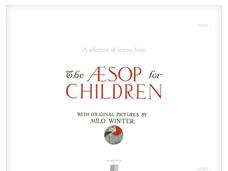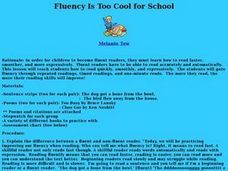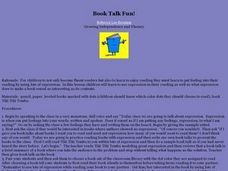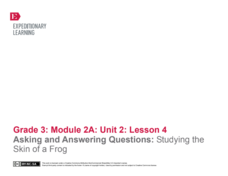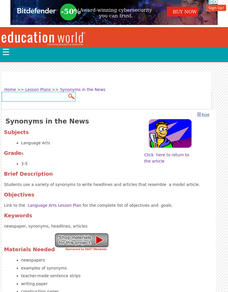Curated OER
Round-Robin Reading Quiz
Small groups of learners read text round-robin style, and then work individually to answer three questions based on the text. Next, they share their questions and responses and add ideas from the group. The reading strategies detailed...
Super Teacher Worksheets
Idioms
If figurative language makes your kids feel blue or under the weather, use an activity focused on idioms to help them feel on top of the world. Kids complete a chart with seven idiomatic phrases, adding the meaning of each along with an...
Curated OER
Third Grade Fluency Lesson
Third graders read passages of text in an effort to improve their fluency and reading comprehension. In this language arts instructional activity, 3rd graders read passages that are at their reading level, and attempt to increase their...
Curated OER
Guided Reading: Three Little Pigs (Plus Wolf: Javalinas)
Guide your class through reading various versions of The Three Little Pigs. Talk about the traditional story line and then discuss a different point of view: Maybe the wolf was just an innocent bystander! This lesson plan, which has...
Santa Clara County Office of Education
The Rainbow Fish: Activities for Parents to Do with Children at Home
The Rainbow Fish, Marcus Pfister's award-winning story about the joys of sharing, is the inspiration for this resource loaded with fun. Suggestions for language and language arts, math, science, and social studies activities are...
Library of Congress
A Selection of Stories from The Æsop for Children
Read and incorporate a variety of Aesop's Fables into a fable genre study with an eBook produced by the Library of Congress. The interactive eBook contains 146 fables written by Aesop and includes colorful interactive illustrations...
Curated OER
Expression Direction: Growing Independence and Fluency
Looking to move children away from monotone reading? That's what they will practice here. In a guided learning lesson, the class reviews punctuation marks and practices what type of intonation should accompany each. They then listen...
Curated OER
Fluency Is Too Cool for School
What does a successful reader sound like? Help readers gain fluency and become successful readers through repeated readings of given poems. They use the cover-up method to help them decode new words and chart their progress as they...
Curated OER
Hop on the Express Train to Read Expressively
Encourage beginning readers to read expressively. After the teacher models what it's like to read with expression, pairs of learners work together to practice developing this ability. While one learner reads, the other marks a check-list...
Curated OER
Book Talk Fun!: Growing Independence and Fluency
Master reading fluently and with emotion and expression! Young learners read and reread the book Tiki Tiki Tembo by Arlene Mosel to practice this strategy. The remark on the end punctuation to help them decide how to read the...
Curated OER
Reading With Expression
Reading with fluency and expression is an important skill for beginning readers to develop. They discuss what it means to read with expression and observe the teacher reading Goldilocks and the Three Bears without any interest...
Curated OER
"Now You Hear Me, Now You Don't!" Growing Independence and Fluency Design
Help young learners unlock the joy of silent reading by explicitly teaching comprehension methods such as cross-checking to figure out the meaning of unknown words. Practice and model expectations for behavior, and then set the class...
K12 Reader
What is Culture?
What makes up a society? Read a passage about culture and community and answer five reading comprehension questions.
K12 Reader
Classifying Triangles
Bring math and reading informational text together with a reading comprehension lesson. After kids read about isosceles, scalene, and equilateral triangles, they answer five comprehension questions to demonstrate how they can use context...
K5 Learning
Ann and Frank
Challenge your third and fourth graders to look deeply into a text with a reading comprehension activity. After learners finish the short passage, they answer four questions that range in levels of difficulty and analysis.
Curated OER
Understanding Paragraph Basics
Full of informative, helpful, and accessible activities, a language arts packet is sure to be a valuable part of your writing unit. It's versatile between reading levels and grade levels, and focuses on the most efficient ways for your...
EngageNY
Asking and Answering Questions: Studying the Skin of a Frog
English language arts and science combine in a lesson that focuses on asking and answering questions about frog skin. Discussion, a read-aloud, and partner work lead the way towards a three-page worksheet that tests learners'...
K12 Reader
In Danger of Extinction
What happens when a species becomes extinct? Sharpen your reading skills with a passage about how koalas have gotten close to being an endangered species.
K12 Reader
National Symbols
What are the most prominent symbols of the United States? Learn about the bald eagle, the American flag, and the Statue of Liberty in a reading comprehension activity that includes a short passage and five reflective questions.
K12 Reader
Three Levels of Government
Help your learners work their way through a reading assignment for informational text. Using context clues, they answer five comprehension question based on a short passage about the three levels of government: local government, state...
K5 Learning
The Eagle and the Fox
How does a fox outsmart an eagle and all the creatures of the sea? Read about a tricky fox with a short story, followed by four comprehension questions about the plot and another possible endings.
K5 Learning
The Blind Men and the Elephant
Sometimes it's necessary to view the whole picture before making a judgment about a small part. Read a short story about five blind men who try to identify an elephant by feeling different parts and coming to their own conclusions....
Curated OER
Language Arts Lesson Plan
Students use a variety of synonyms to write headlines and articles that resemble a model article.
Have Fun Teaching
When Am I? (16)
How can you tell when a story takes place? Use context clues to infer the time of day and seasons of five short reading passages. Kids then note each passage's time period as daytime or nighttime, as well as winter or summer.
Other popular searches
- Reading Language Arts
- Reading and Language Arts
- Language Arts Fluency
- Reading Game Language Arts
- Reading/language Arts
- Reading. Language Arts
- Language Arts Read Aloud
- Guided Reading Language Arts
- Language Arts Reading Fluency





